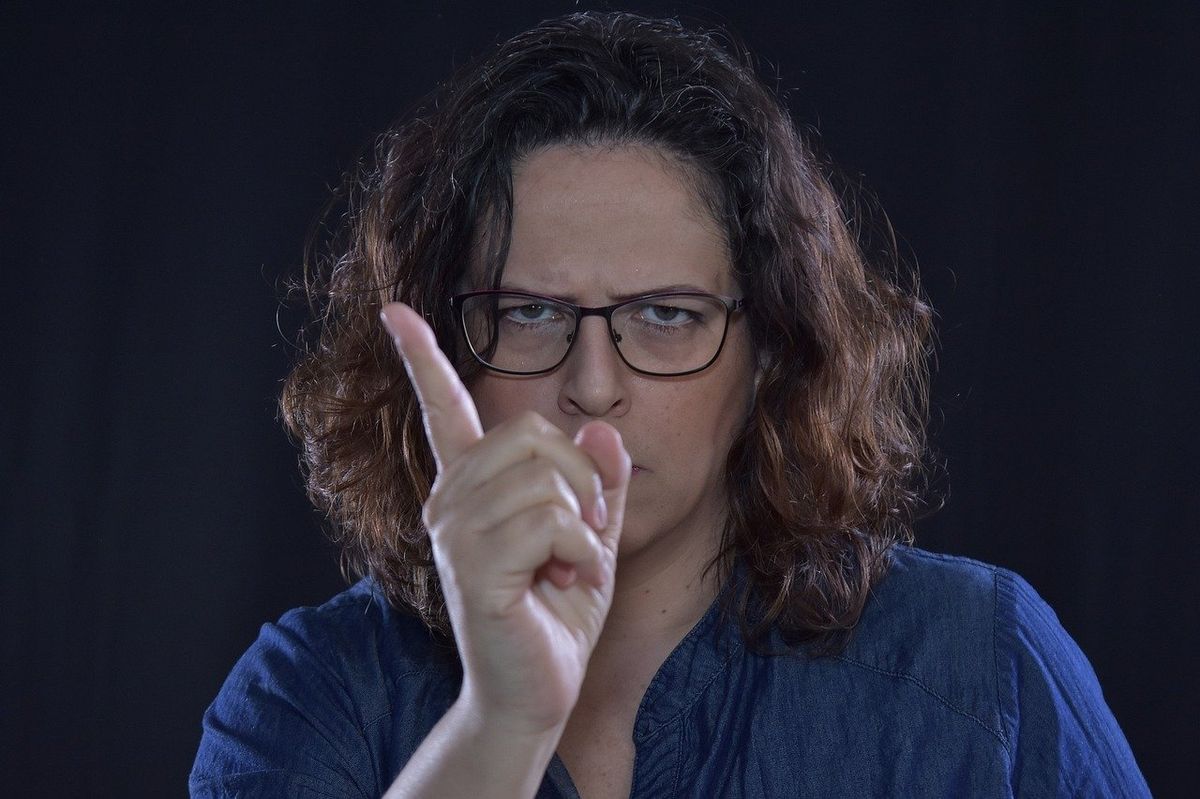Stop blaming the 'Karens.' The people who complain the most have a different name.
The stereotype has been wrong all along.

A woman giving a stern warning.
Over the past few years, women named Karen have taken a lot of heat in the media. The term "Karen" has been used to describe a specific type of entitled, privileged and often middle-aged white woman. Typically, "Karen” is depicted as demanding, self-important and constantly seeking to escalate minor inconveniences to authority figures, like demanding to "speak to the manager."
Identifying the folks who create unnecessary drama in our world is important. But calling them a “Karen” isn’t the best way to solve the problem. There are many reasons to have an issue with the “Karen” stereotype. First, it’s terrible for people named Karen, and it’s also a connotation that many feel is racist, sexist and ageist.
Further, according to a new study by Trustpilot, the stereotype isn’t accurate. A recent survey by the online media site found that the people who leave the most one-star reviews aren’t female, and the women who do it the most aren’t named Karen.
Trustpilot is a site where people can review a business from which they’ve purchased a product or contacted customer service. According to TrustPilot, the number one biggest one-star reviewers are named John, not Karen.
“The name John is top for [one-star] reviews in the US, with the rest of the top five positions filled by David, Michael, Chris and James,” the site wrote in a press release. “Looking at specific categories, John is also first for negative reviews in Business Services, Electronics and Technology, Shopping and Fashion, and Money and Insurance. Meanwhile, Lisa left the most [one-star] reviews in our Beauty and Wellbeing category.”
So, if your name is Karen, keep this story in your back pocket next time someone stereotypes you as an entitled complainer. The real complainers are the Johns and, for the women, Lisas.
Why do people go online and write negative reviews? Psychologist William Berry writes in Psychology Today that people get many positive benefits from complaining, although they may annoy everyone around them.
The first big reason is an ego boost. When people complain, they feel validated. It also makes them feel superior to others. Complaining can also bring like-minded people together. If you and a significant other have ever been mistreated in a restaurant or car dealership, having a mutual enemy can work wonders for your relationship.
There are also entire groups of people who bond over a common gripe.
People who habitually complain may do so because of the brain’s negativity bias. “The human brain, geared for survival, focuses on negatives (as they appear more threatening to survival) than on positives (which enhance life but are less vital for survival),” Berry writes. “As the brain perceives negatives at an approximated ratio of five to one, there is simply more to complain about than there is to be grateful for. Additionally, this may lead to less general happiness.”
Here are the top 15 names of consumers who leave the most one-star reviews on Trustpilot. (Also known as the folks that owe the Karens out there an apology.)
1. John
2. David
3. Michael
4. Chris
5. James
6. Mike
7. Mark
8. Robert
9. Alex
10. Paul
11. Lisa
12. Sarah
13. Steve
14. Sam
15. Daniel
This article originally appeared two years ago.
- Funny mom lays down the law by giving her son 7 back-to-school rules that every kid must hear ›
- Footage of people from the 80s whining about seatbelt mandates looks pretty silly now ›
- 'If we dismissed everyone the way we dismiss moms' video hits home, but not just for moms ›
- White man brings Black woman to tears with his kindness - Upworthy ›
- Millennials are voting on which name represents their generation's 'Karen' - Upworthy ›



 In a 4-day model, kids often (but not always) receive less instructional time. Photo by
In a 4-day model, kids often (but not always) receive less instructional time. Photo by 


 A woman looking at her phone on the toilet.via
A woman looking at her phone on the toilet.via  A man looking at his phone on the toilet.via
A man looking at his phone on the toilet.via 